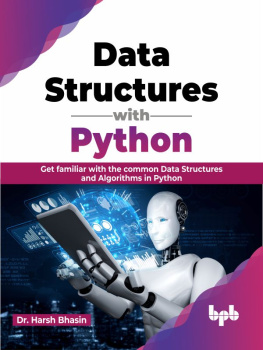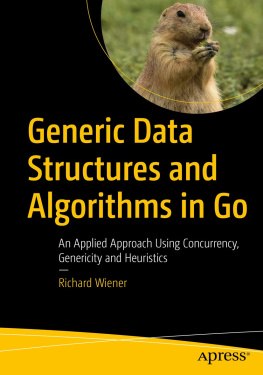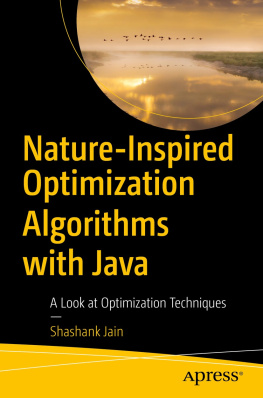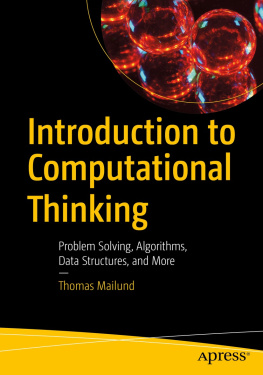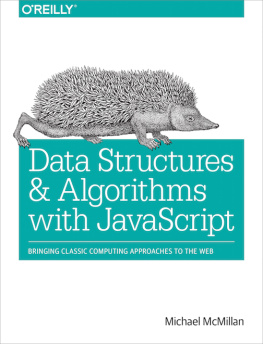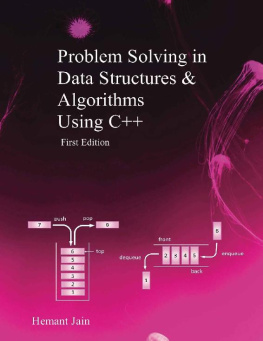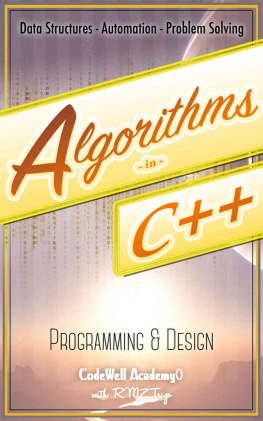Jain - Problem Solving in Data Structures & Algorithms Using Java
Here you can read online Jain - Problem Solving in Data Structures & Algorithms Using Java full text of the book (entire story) in english for free. Download pdf and epub, get meaning, cover and reviews about this ebook. year: 2018, genre: Computer. Description of the work, (preface) as well as reviews are available. Best literature library LitArk.com created for fans of good reading and offers a wide selection of genres:
Romance novel
Science fiction
Adventure
Detective
Science
History
Home and family
Prose
Art
Politics
Computer
Non-fiction
Religion
Business
Children
Humor
Choose a favorite category and find really read worthwhile books. Enjoy immersion in the world of imagination, feel the emotions of the characters or learn something new for yourself, make an fascinating discovery.

Problem Solving in Data Structures & Algorithms Using Java: summary, description and annotation
We offer to read an annotation, description, summary or preface (depends on what the author of the book "Problem Solving in Data Structures & Algorithms Using Java" wrote himself). If you haven't found the necessary information about the book — write in the comments, we will try to find it.
Jain: author's other books
Who wrote Problem Solving in Data Structures & Algorithms Using Java? Find out the surname, the name of the author of the book and a list of all author's works by series.
Problem Solving in Data Structures & Algorithms Using Java — read online for free the complete book (whole text) full work
Below is the text of the book, divided by pages. System saving the place of the last page read, allows you to conveniently read the book "Problem Solving in Data Structures & Algorithms Using Java" online for free, without having to search again every time where you left off. Put a bookmark, and you can go to the page where you finished reading at any time.
Font size:
Interval:
Bookmark:
Problem Solving in Data Structures& Algorithms Using Java Second Edition By Hemant Jain
ProblemsSolving in Data Structures & Algorithms Using Java Hemant Jain Copyright Hemant Jain 2018. All Right Reserved. Hemant Jain asserts the moral right to be identified as theauthor of this work. All rights reserved. No part of this publication may bereproduced, stored in or introduced into a retrieval system, or transmitted, inany form, or by any means (electrical, mechanical, photocopying, recording orotherwise) without the prior written permission of the author, except in thecase of very brief quotations embodied in critical reviews and certain othernon-commercial uses permitted by copyright law.
ACKNOWLEDGEMENT The author is very gratefulto GOD ALMIGHTY for his grace and blessing.
ACKNOWLEDGEMENT The author is very gratefulto GOD ALMIGHTY for his grace and blessing.
My deepest gratitude to my elderbrother Dr. Sumant Jain for his help and support. This book would not have beenpossible without the support and encouragement he provided. I would like to expressprofound gratitude to my friends Naveen Kaushik, Love Singhal, Anand Rajashekaranand Harvinder Bholowasia for their invaluable encouragement, supervision anduseful suggestion throughout this book writing work. Their support andcontinuous guidance enable me to complete my work successfully. Hemant Jain
Data structures defines the way in which data is arranged in memoryfor fast and efficient access while algorithms are a set of instruction tosolve problems by manipulating these data structures. Designing an efficient algorithm is a very important skillthat all software companies, e.g. Microsoft, Google, Facebook etc. pursues.Most of the interviews for these companies are focused on knowledge of data-structuresand algorithms. They look for how candidates use concepts of data structuresand algorithms to solve complex problems efficiently. Apart from knowing, aprogramming language you also need to have good command of these key computerfundamentals to not only qualify the interview but also excel in you jobs as asoftware engineer.
This book assumes that you are a Java language developer.You are not an expert in Java language, but you are well familiar with conceptsof classes, functions, arrays, pointers and recursion. At the start of thisbook, we will be looking into Complexity Analysis followed by the various datastructures and their algorithms. We will be looking into a Linked-List, Stack,Queue, Trees, Heap, Hash-Table and Graphs. We will also be looking intoSorting, Searching techniques. In last few chapters, we will be looking into various algorithmictechniques.
The preparation plan depends upon the preparationduration and companies that you are planning to target. Below are thethree-preparation plan for 1 Month, 3 Month and 5 Month durations.
| Time | Chapters | Explanation |
| Week 1 | Chapter 1: Algorithms Analysis Chapter 2: Approach To Solve Algorithm Design Problems Chapter 3: Abstract Data Type | You will get a basic understanding of how to find complexity of a solution. You will come to know how to handle new problems. You will read about a variety of datatypes and their uses. |
| Week 2 | Chapter 4: Sorting Chapter 5: Searching Chapter 13: String Algorithms | Searching, Sorting and String algorithm consists of a major portion of the interviews. |
| Week 3 | Chapter 6: Linked List Chapter 7: Stack Chapter 8: Queue | Linked list, Stack and Queue are some of the favorites in an interview. |
| Week 4 | Chapter 9: Tree | In this portion, you will read about Trees. Now you are well versed to go for interviews. Best of luck. |
| Time | Chapters | Explanation |
| Week 1 | Chapter 1: Algorithms Analysis Chapter 2: Approach To Solve Algorithm Design Problems Chapter 3: Abstract Data Type | You will get a basic understanding of how to find complexity of a solution. You will know how to handle new problems. You will read about a variety of datatypes and their uses. |
| Week 2 Week 3 | Chapter 4: Sorting Chapter 5: Searching Chapter 13: String Algorithms | Searching, sorting and string algorithm consists of a major portion of the interviews. |
| Week 4 Week 5 | Chapter 6: Linked List Chapter 7: Stack Chapter 8: Queue | Linked list, Stack and Queue are some of the favorites in an interview. |
| Week 6 Week 7 | Chapter 9: Tree Chapter 10: Priority Queue / Heap | In this portion, you will read about trees and heap data structures. |
| Week 8 Week 9 | Chapter 11: Hash-Table Chapter 12: Graphs | Hash-Table is used throughout this book in various places, but now it is time to understand how Hash-Table is actually implemented. Graphs are used to propose a solution many real life problems. |
| Week 10 Week 11 Week 12 | Revision of the chapters listed above. | At this time, you need to revise all the chapters that we have gone through in this book. Whatever remains needs to be completed and the exercise that remain unsolved need to be solved at this time |
Ifyou are targeting for google, Facebook, etc., Then it is highly recommended tojoin topcoder and make practice as much as possible.
| Time | Chapters | Explanation |
| Week 1 Week 2 | Chapter 1: Algorithms Analysis Chapter 2: Approach To Solve Algorithm Design Problems Chapter 3: Abstract Data Type | You will get a basic understanding of how to find complexity of a solution. You will know how to handle unseen problems. You will read about a variety of datatypes and their uses. |
| Week 3 Week 4 Week 5 | Chapter 4: Sorting Chapter 5: Searching Chapter 13: String Algorithms | Searching, sorting and string algorithm consists of a major portion of the interviews. |
| Week 9 Week 10 | Chapter 9: Tree Chapter 10: Heap |
Font size:
Interval:
Bookmark:
Similar books «Problem Solving in Data Structures & Algorithms Using Java»
Look at similar books to Problem Solving in Data Structures & Algorithms Using Java. We have selected literature similar in name and meaning in the hope of providing readers with more options to find new, interesting, not yet read works.
Discussion, reviews of the book Problem Solving in Data Structures & Algorithms Using Java and just readers' own opinions. Leave your comments, write what you think about the work, its meaning or the main characters. Specify what exactly you liked and what you didn't like, and why you think so.


